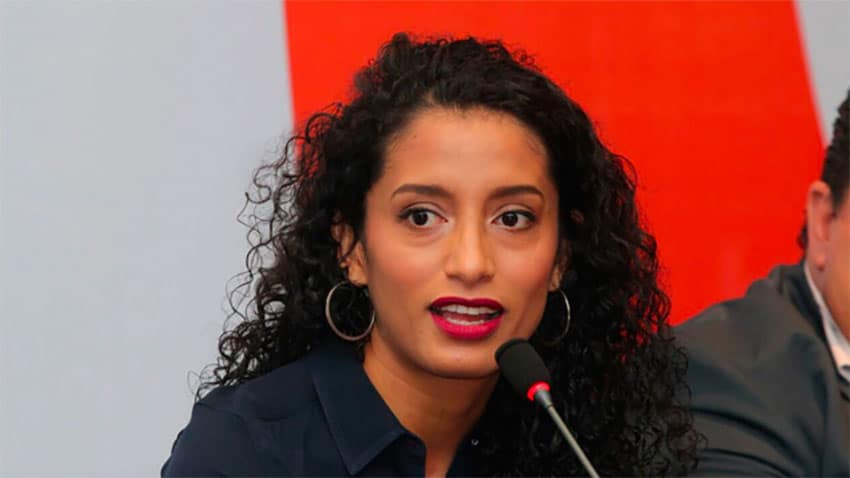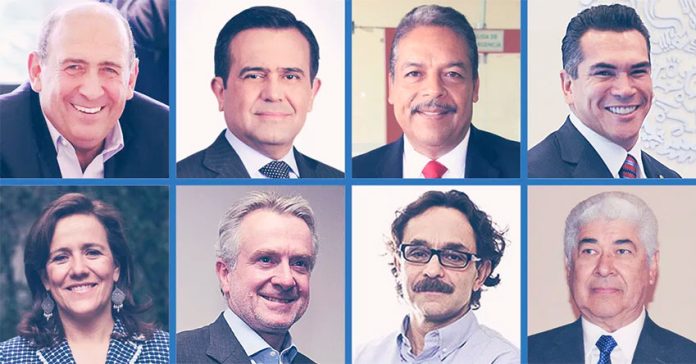Opposition parties seeking to wrest control of the lower house of Congress from the ruling Morena party are fielding candidates who are political “dinosaurs” and have nothing new to offer, according to three experts.
The National Action Party (PAN), the Institutional Revolutionary Party (PRI) and the Democratic Revolution Party (PRD), which have formed a three-party alliance to contest the June 6 election, have announced some of the plurinominal, or proportional representation, candidates they hope will become federal deputies in a renewed lower house in which Morena and its allies no longer have a majority.
The PAN, a conservative party that is currently the main opposition force, and the PRI, which held power for most of the 20th century as well as the six years prior to President López Obrador coming to office in late 2018, have faced the most criticism over their proposed candidates.
Among the names put forward by the former are Margarita Zavala, wife of former president Felipe Calderón, an ex-lawmaker and a 2018 presidential hopeful; Santiago Creel, interior minister in the 2000-2006 government led by former president Vicente Fox and an ex-senator; Gabriel Quadri, a minor party candidate in the 2012 presidential election; Cecilia Romero, a former lawmaker and PAN national president; and Francisco Ramírez, a former Guadalajara mayor, governor of Jalisco and interior minister in the first year of Calderón’s 2006-2012 term.
The PRI, which has a tarnished reputation due to the myriad scandals in which it has been embroiled over the years, has proposed its own list of recycled candidates. They include Alejandro Moreno, PRI national president and a former governor of Campeche; Ildefonso Guajardo, economy minister in the 2012-2018 government of former president Enrique Peña Nieto; Rubén Moreira, a former governor of Coahuila and ex-secretary general of the PRI; Carolina Viggiano, the current secretary general of the PRI; and Tereso Medina, a PRI-affiliated union leader and former deputy.

In contrast, the PRD has proposed more grassroots candidates without previous close ties to the party, among whom are Edna Díaz, a former taekwondo champion, and Andrea Rocha, a defense lawyer.
In addition to describing the PAN and PRI candidates as dinosaurs, political experts who spoke to the newspaper El Universal said the names put forward by the two parties are representative of cronyism, a practice of which López Obrador has long accused his political adversaries of being guilty. They also suggested the parties should have sought candidates among the wider citizenry rather than among people already well-entrenched in their ranks.
Sara Sefchovich, a renowned sociologist, writer and National Autonomous University academic, said the candidates proposed by the opposition parties don’t offer voters a viable alternative at the ballot box.
“In my opinion, the problem is that they’re only looking after themselves, guaranteeing themselves a job. … They’re not really offering an alternative, an opposition to which citizens can turn. They’re the same old people and their reputation precedes them – not in a good sense,” she said.
Sefchovich said that she would love to see Morena lose its majority in the lower house but for that to happen “respectable candidates” are needed and some of those put forward by the opposition parties don’t meet that criterion. Specifically citing Moreira, who led a Coahuila government tainted by corruption allegations, some of the candidates are “unpresentable,” she said.
The academic charged that Morena, which was founded by López Obrador and has provided a new political home for many people with previous links to other parties, is also fielding poor candidates, adding that could help the tripartite opposition bloc known as Va Por México (Go for Mexico).
“Imagine an electoral ballot on which you have to choose between a Moreira or a Noroña. It gives you the chills,” Sefchovich said, referring in the latter case to Gerardo Fernández Noroña, a controversial deputy with the Labor Party, a Morena ally.
“… That’s the way things are for citizens,” she said.
Salvador García Soto, a political scientist and columnist, contended that the PAN and the PRI are sending a very negative message with their candidate choices, asserting that they fall well short of citizens’ expectations. He said that the parties appear to be betting on the theory that political experience among its candidates will help their alliance prevail but charged that they have instead created the impression that they don’t have any new emerging leaders.
One lesson the PAN and the PRI should have learned from their respective losses at recent presidential elections is that they need to be “more open to the citizenry, young leaders and new faces in politics,” García said.
“That is … what the people demand but far from that they’re betting on the same old people who had their opportunity at their own time,” he said.
García said the candidates put forth by the PAN and PRI only serve to support López Obrador’s claim that the opposition is morally bankrupt.

“ [The PRI and the PAN] are not up to the level that the citizens are demanding of the opposition parties, and not up to the level that the country and democracy need, which is to find a counterweight to the presidential power … of López Obrador,” he said.
José Antonio Crespo, a political scientist at CIDE, a Mexico City university, said the candidates “don’t excite people because there’s nothing new – there are no fresh people.”
Citing recent polls, he said that Morena has an advantage going into the June 6 election and suggested that the candidates put forth by the opposition coalition won’t do anything to weaken the ruling party’s upper hand.
However, Crespo noted some people will likely vote for Morena’s rivals even though their candidates don’t inspire enthusiasm simply because they want the lower house to be an obstacle to, rather than an enabler of, the president’s agenda.
However, he predicted that Morena and its allies will prevail and maintain their majority.
“The [opposition] parties aren’t doing things right, they’re self-absorbed with their own people. … I believe they’re not sending a good message,” Crespo said.
The news website Sin Embargo described the candidates put forward by the opposition parties as “spent cartridges” and noted that the selections are not reflective of the “internal transformation” they claim to have carried out to make themselves more competitive in light of the landslide victory achieved by López Obrador and Morena at federal and state elections in 2018.
Source: El Universal (sp), Sin Embargo (sp)
